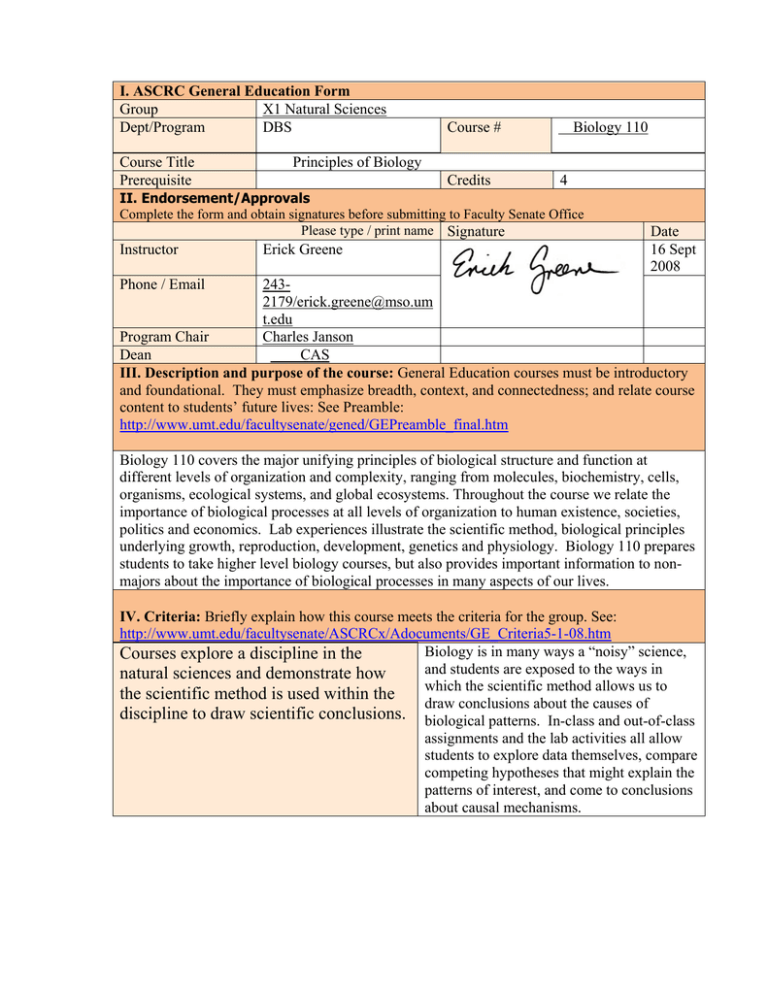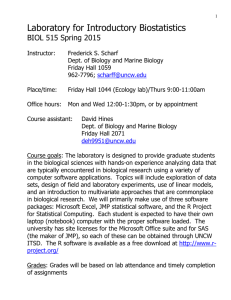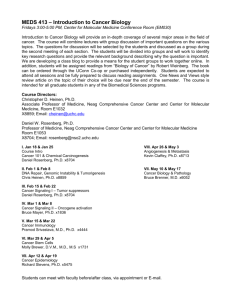I. ASCRC General Education Form Group X1 Natural Sciences
advertisement

I. ASCRC General Education Form Group X1 Natural Sciences Dept/Program DBS Course # Course Title Prerequisite Credits Biology 110 Principles of Biology 4 II. Endorsement/Approvals Complete the form and obtain signatures before submitting to Faculty Senate Office Please type / print name Signature Instructor Erick Greene Date 16 Sept 2008 Phone / Email 2432179/erick.greene@mso.um t.edu Program Chair Charles Janson Dean CAS III. Description and purpose of the course: General Education courses must be introductory and foundational. They must emphasize breadth, context, and connectedness; and relate course content to students’ future lives: See Preamble: http://www.umt.edu/facultysenate/gened/GEPreamble_final.htm Biology 110 covers the major unifying principles of biological structure and function at different levels of organization and complexity, ranging from molecules, biochemistry, cells, organisms, ecological systems, and global ecosystems. Throughout the course we relate the importance of biological processes at all levels of organization to human existence, societies, politics and economics. Lab experiences illustrate the scientific method, biological principles underlying growth, reproduction, development, genetics and physiology. Biology 110 prepares students to take higher level biology courses, but also provides important information to nonmajors about the importance of biological processes in many aspects of our lives. IV. Criteria: Briefly explain how this course meets the criteria for the group. See: http://www.umt.edu/facultysenate/ASCRCx/Adocuments/GE_Criteria5-1-08.htm Biology is in many ways a “noisy” science, Courses explore a discipline in the and students are exposed to the ways in natural sciences and demonstrate how which the scientific method allows us to the scientific method is used within the draw conclusions about the causes of discipline to draw scientific conclusions. biological patterns. In-class and out-of-class assignments and the lab activities all allow students to explore data themselves, compare competing hypotheses that might explain the patterns of interest, and come to conclusions about causal mechanisms. Courses address the concept of analytic uncertainty and the rigorous process required to take an idea to a hypothesis and then to a validated scientific theory. Lab courses engage students in inquirybased learning activities where they formulate a hypothesis, design an experiment to test the hypothesis, and collect, interpret, and present the data to support their conclusions. How do we know what we know? Biology 110 stresses this theme in a wide variety of ways. In examples during lectures, results are not simply presented as “facts,” but the experiments and often fascinating personal stories of the scientists behind the studies are presented. Lab activities are structured around proposing hypotheses, collecting and analyzing data, and drawing conclusions from the results. Thus the students get to practice the scientific method in many ways in the class. V. Student Learning Goals: Briefly explain how this course will meet the applicable learning goals. See: http://www.umt.edu/facultysenate/ASCRCx/Adocuments/GE_Criteria5-1-08.htm This broad survey course focuses on the Understand the general principles associated with the discipline(s) studied; main principles underlying all of biology, from molecules to ecosystems. The class activities, assignments and labs Understand the methodology and activities scientists use to gather, validate are all designed to expose students to the wide variety of methods used by biologists and interpret data related to natural to explore the biological world. processes; Detect patterns, draw conclusions, develop conjectures and hypotheses, and test them by appropriate means and experiments; Understand how scientific laws and theories are verified by quantitative measurement, scientific observation, and logical/critical reasoning; The class activities, assignments and labs are all designed to engage the students in the scientific method. Laws and theories are actually never “verified” in science. Hypotheses that have withstood the test of time and many repeated attempts to reject them can eventually be elevated to the status of a theory or law, but scientists generally do not claim that things have been “verified.” Students are exposed broadly to the scientific method, and given some of the tools to objectively and critically examine data and relate those to predictions made by hypotheses. Understand the means by which analytic The class exposes students to the noisy uncertainty is quantified and expressed in nature of much of biology, and they are exposed to ways in which scientists deal the natural sciences. with this problem of signal to noise ratio. For example, basic concepts such as the importance of replicates and statistical measures of variation are introduced to show how we search for patterns in the face of uncertainty and natural variability. VII. Syllabus: Paste syllabus below or attach and send digital copy with form. ⇓ The syllabus should clearly describe how the above criteria are satisfied. For assistance on syllabus preparation see: http://teaching.berkeley.edu/bgd/syllabus.html PRINCIPLES OF BIOLOGY (Biology 110) Spring Semester 2008 Professor Erick Greene: HS 205; 243-2179; erick.greene@mso.umt.edu Office hours: Monday and Fridays: 2-3, or by appointment Teaching Assistants Ting Wang Nandhakumar Thayanidhi Elliott Parsons Lindy Mullen Margie Kinnersly Jenny Gremer email ting.wang@grizmail.umt.edu nandhakumar.thayanidhi@grizmail.umt.edu elliott_parsons@yahoo.com lindy.mullen@umontana.edu mkinners@yahoo.com jennifer.gremer@mso.umt.edu Text: Biology, by Neil Campbell and Jane Reece, 7th Edition, 2005. Course Overview and Objectives Biology is a diverse science that includes biochemistry, molecular and cell biology, medicine, genetics, evolutionary biology, ecology, behavior, ecosystem biology, and more. Biological knowledge is also increasingly important in other disciplines, such as economics, politics, social policy, ethics, business, technology, engineering and design, and architecture, to name a few. In fact, it is difficult to find any human activity for which an understanding of biology is not increasingly relevant and important. This is a broad survey course and so we will cover many topics this semester. Biology 110 feeds into many other courses, and is a foundation for Cell and Molecular Biology (Biology 221), Genetics and Evolution (Biology 223), Developmental Biology (Biology 301), Anatomy and Physiology (Biology 312), Ecology (Biology 340/341) and many others. The goals of this class are for you to: 1) understand science as a process; 2) be able to construct testable questions and interpret data and observations; 3) communicate your ideas orally and in writing; 4) understand how energy is captured, stored, used, and passed though biological systems; 5) understand how biological information is preserved, inherited and modified; 6) be able to describe the process of natural selection; 7) understand how the process of evolution works at molecular and population levels; 8) understand hierarchical levels of biological organization (sub-cellular, cellular, organismal, populations, communities and ecosystems). COURSE SCHEDULE Week 1 2 3 4 5 6 7 8 9 10 Dates W 23 Jan F 25 Jan M 28 Jan W 30 Jan F 1 Feb M 4 Feb W 6 Feb F 8 Feb M 11 Feb W 13 Feb F 15 Feb M 18 Feb W 20 Feb F 22 Feb M 25 Feb W 27 Feb F 29 Feb M 3 Mar W 5 Mar F 7 Mar M 10 Mar W 12 Mar F 14 Mar M 17 Mar W 19 Mar F 21 Mar M 24 Mar Topic Introduction/Overview Mustards/Chickens/Dogs Natural Selection, Galapagos Ecology Climate Population Growth Predators Prey Biomimicry – Cindy Gilbert Required Reading From Text 1 22, 23.4 52.1-52.3 53.1-53.2 Ray Callaway - Knapweed NO SCHOOL TEST 1 Chemistry of Life What’s so special about water and carbon? Macromolecules Carbohydrates, lipids, proteins and nucleic acids Cells Metabolism/Respiration TEST 2 2 3 4 5 6 8, 9 W 26 Mar SPRING BREAK F 28 Mar 11 M 31 Mar Photosynthesis 10 W 2 Apr F 4 Apr 12 M 7 Apr Cell Cycle 12 W 9 Apr Mitosis F 11 Apr Meiosis 13 13 M 14 Apr Mendel and Gene 14 W 16 Apr F 18 Apr Molecular Genetics 14 M 21 Apr DNA Replication 16 W 23 Apr F 25 Apr 15 M 28 Apr Genes to Proteins 17 W 30 Apr F 2 May 16 M 5 May FINAL EXAM – 3:20 – 5:20 IN ULH 101 In addition to material covered in lectures, you will be responsible for about 20-30 pages of reading per week from the textbook. Since the material builds upon previous topics it is very important that you to keep up with the readings. If you fall behind, you will find it difficult to catch up. Grading Grades in this course will be assigned in the +/- system. Your grade will be based on the following: Test 1 Test 2 Final Mastering Biology In-class activities Lab 10 10 25 (cumulative final) 10 5 40 100 If you have problems with class material or time conflicts, I urge you to talk with me as EARLY as possible. I will be better able to help you if you talk with me as problems arise; I will be less sympathetic two minutes before a test. If you cannot meet at any of the designated office hours, feel free to schedule an appointment at another time. Course Material on Blackboard You will be able to access resources for this class through Blackboard. I will post copies of all the powerpoint lectures, labs, as well as other information. We will go over this in class. Login at: http://umonline.umt.edu To use Blackboard you need to use your Official University Email Address (i.e. not a yahoo, gmail or other account). If you need help getting a UM Email, you can get detailed instructions at: http://umt.edu/it/email/studentemail.htm For general UM computer help you can contact the IT Central Help Desk (8am-5pm, 243-4357, itcentral@umontana.edu). If you have Blackboard technical problems, you can contact Marvin Paulson at 243-6394 or at course-support@umontana.edu. Mastering Biology This is an online program that will give you questions to help master material we cover in class and in the readings. I will go over how to access this program and use it later. You will not be graded on how well you do on these practice questions, but rather on your participation. Many of the questions on the tests and the final exam will be taken from these exercises. Computing Resources The Division of Biological Sciences manages a computer lab that is dedicated to use for biology courses. You need to sign up for an account, and this will enable you to have access to the computers, software, and printers. DBS provides you with $2 free printing in this lab, and after you use that up you can set up an account for additional printing ($0.10 per page black and white, and $0.20 per page for really good color copies). To set up an account, go to Health Sciences 114 between 8 AM and 5 PM and a lab monitor will help you. Plagiarism and Cheating Although you will be encouraged to work collaboratively with others in this class and the lab, the work you hand in must be your own. A good rule of thumb is that you can work together up to the point of committing words to paper (or word processor). After that, the words you put down should be your own. I remind you of the official University policy on plagiarism: "Plagiarism is the representing of another's work as one's own. It is a particularly intolerable offense in the academic community and is strictly forbidden. Students who plagiarize may fail the course and may be remanded to Academic Court for possible suspension or expulsion (See Student Conduct Code section of this catalog). Students must always be very careful to acknowledge any kind of borrowing that is included in their work. This means not only borrowed wording but also ideas. Acknowledgment of whatever is not one's own original work is the proper and honest use of sources. Failure to acknowledge whatever is not one's own original work is plagiarism." (From The University of Montana Catalog). If you have any questions about the line between collaboration and plagiarism, see me before you hand in material. Assignments from two or more students that have significant overlap will be regarded as reflecting a violation of the expectation that students turn in independent work. All the students involved will be given no points for that material, and the violation will be dealt with according to the Student Conduct Code. For more information on the official UM policies on plagiarism and the Student Conduct Code you can refer to: http://www.lib.umt.edu/services/plagiarism/index.htm http://ordway.umt.edu/sa/documents/fromWeb/StudentConductCode1.pdf Penalties for plagiarism and cheating can be as severe as suspension or expulsion from The University. *Please note: As an instructor of a general education course, you will be expected to provide sample assessment items and corresponding responses to the Assessment Advisory Committee.




